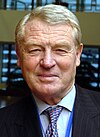High Representative for Bosnia and Herzegovina
 From Wikipedia - Reading time: 13 min
From Wikipedia - Reading time: 13 min
| High Representative for Bosnia and Herzegovina | |
|---|---|
 | |
since 1 August 2021 | |
| Style | Mr. High Representative (informal) His Excellency (diplomatic) |
| Residence | Grbavica, Sarajevo |
| Inaugural holder | Carl Bildt |
| Formation | Dayton Agreement 14 December 1995 |
| Salary | 24,000 EUR per month |
| Website | www |
 |
|---|
|
|
The High Representative for Bosnia and Herzegovina, together with the Office of the High Representative (OHR) in Bosnia and Herzegovina, were created in 1995 immediately after the signing of the Dayton Agreement which ended the 1992–1995 Bosnian War. The purpose of the High Representative and the OHR is to oversee the civilian implementation of the Dayton agreement. They also serve to represent the countries involved in the implementation of the Dayton Agreement through the Peace Implementation Council (PIC), which chooses the High Representative.
So far, all of the High Representatives named have been from European Union countries, and their principal deputies have typically been from the United States. The Principal Deputy High Representative serves as International Supervisor for Brčko, representing the international community in the Brčko District.[1][2][3][4][5][6]
Legal basis in the Dayton Peace Agreements
[edit]The Dayton Agreement created the legal basis for the OHR. Its Annex 10 provides for the institution of the Office of the High Representative (OHR) in Bosnia and Herzegovina to oversee the civilian implementation of the agreement, representing the countries involved in the Dayton Accords through the Peace Implementation Council.
The "Bonn Powers" of the OHR
[edit]
At its December 1997 meeting in Bonn, the Peace Implementation Council agreed in granting further substantial powers to the OHR, in order to avoid the implementation of the Dayton Agreement being delayed or obstructed by local nationalist politicians. The OHR was requested to:
- Adopt binding decisions when local parties seem unable or unwilling to act;
- Remove from office public officials who violate legal commitments or, in general, the DPA.[7][8]
The Bonn powers were extensively used by the OHR in the following decade. Some examples include the adoption of the Defence reform in April 2003, with the suppression of the Supreme Defence Council of the Republika Srpska, and the amendment of Entity Constitutional Laws.[8]
Until 2004, the OHR had dismissed a total of 139 officials, including judges, ministers, civil servants and members of parliaments, sometimes along with freezing their bank accounts. After the 2002 elections, the OHR scrutinised all political candidates for major ministerial positions at entity and state level.[8]
Fusion with the EUSR post
[edit]Between 2002 and 2011, the High Representative also served as the European Union Special Representative to Bosnia and Herzegovina.[9][10]
Under Christian Schwarz-Schilling, the OHR seemed to soften its invasiveness, thanks to pressures from the Council of Europe and a growing EU involvement. The number of OHR legislative initiatives and of dismissed officials lowered.[8]
On 27 February 2008, the PIC decided to end the High Representative's mandate on 30 June 2008. The EU decision to shut down the OHR by June 2007 unexpectedly aroused disappointment and concern in the Bosnian population, NGOs, and politicians.[8] However, since the PIC February 2008 review, it was decided to extend that mandate indefinitely until a set of positive benchmarks have been fulfilled.[11]
The "double hatting" between EUSR and OHR was discontinued in 2011, when the EU representative post was fused between the EUSR and the head of the EU delegation.
Conditions for closure of the Office of the High Representative
[edit]
In February 2008, the Peace Implementation Council set the conditions for closure of the OHR. The most critical issues will be considered objectives to be achieved by the BiH authorities before transition from OHR to a European Union presence can take place. From a long list of known priorities the PIC selected the key ones for transition, for closure of OHR:[11]
- Resolution of State Property
- Resolution of Defence Property
- Completion of the Brčko Final Award
- Fiscal Sustainability of the State – completed as of May 2010, should be continuously sustained[12]
- Entrenchment of the Rule of Law – completed as of May 2010, should be continuously sustained[12]
In addition to these objectives there are also two conditions:
- Signing of the Stabilisation and Association Agreement – completed on 16 June 2008
- Positive assessment of the situation in BiH by the PIC Steering Board – to be assessed after all others are completed
An additional non-written condition to be enforced through the "assessment by the PIC Steering Board" final condition, was adopted later by the US and some EU countries:[13]
- Reform of the constitution to comply with ECHR decision of December 2009
The closure of the OHR is considered by the Steering Board of the Peace Implementation Council to be a pre-condition for EU membership.[13][14]
Criticisms
[edit]In the many years attempting to facilitate the integration of a stable federal Bosnian state, it has been argued that the OHR posed challenges in accomplishing its principal task.[15] The OHR's prolonged intervention in the politics of Bosnia and Herzegovina has been considered by some as a potential cause of the allegedly low commitment of citizens towards the state, as perceived by the low voter turnout, and of the purported low accountability of politicians, whose actions may be subject to the OHR's review.[8]
Former HR Paddy Ashdown noted the High Representative has "powers that ought to make any liberal blush."[16] Criticisms of the action of the OHR through its Bonn powers include:[8][17]
- the lack of accountability of the position, which is answerable only to the Peace Implementation Council;
- the lack of due process available to those affected by HR decisions.[18]
In addition to the potential consideration of imposing legislation on contentious issues, the OHR "developed the practice of dismissing public officials from their offices and banning them from holding any public employment again ... often without even admitting the dismissed persons to confront the charges brought against them, let alone granting them a fair hearing or a right to appeal."[19] In June 2004, for example, Paddy Ashdown dismissed 58 public officials in a single day.[20] Politicians and judges have been subject to potential removal. Some of those dismissed were allegedly banned for life from holding public office and their bank accounts been frozen as well.[21] Doubts about the legality of both the OHR's interpretation of its mandate and particular actions have been expressed by the Council of Europe and others.[19]
In 2004, the Parliamentary Assembly of the Council of Europe, which Bosnia and Herzegovina had joined in 2002, voiced complaints against OHR's actions, and expressed the need "to define a clear strategy for transferring responsibilities from the High Representative to domestic authorities."[22] Russia and China have rejected the continuation of the office and have tried at the UN to have it terminated.[23] They argue that it violates BiH's sovereignty, and they claim that the West persists with the setup so it can remain the "guardian" of the country.[24] Valentin Inzko, during his tenure as high representative, declared: "We have to wait for the moment that Bosnia–Herzegovina is irreversibly on its way to Euro-Atlantic integration, then we should shut down the Office."[25]
List of High Representatives
[edit]| Portrait | Name (Birth–Death) |
Term of office | Country | |||
|---|---|---|---|---|---|---|
| Took office | Left office | Span | ||||
| 1 | 
|
Carl Bildt (b. 1949) |
14 December 1995 | 17 June 1997 | 1 year, 185 days | |
| 2 | 
|
Carlos Westendorp (b. 1937) |
18 June 1997 | 17 August 1999 | 2 years, 60 days | |
| 3 | 
|
Wolfgang Petritsch (b. 1947) |
18 August 1999 | 26 May 2002 | 2 years, 281 days | |
| 4 | 
|
Paddy Ashdown Baron Ashdown of Norton-sub-Hamdon (1941–2018) |
27 May 2002 | 31 January 2006 | 3 years, 249 days | |
| 5 | 
|
Christian Schwarz-Schilling (b. 1930) |
1 February 2006 | 30 June 2007 | 1 year, 149 days | |
| 6 | 
|
Miroslav Lajčák (b. 1963) |
1 July 2007 | 28 February 2009 | 1 year, 242 days | |
| 7 | 
|
Valentin Inzko (b. 1949) |
1 March 2009 | 31 July 2021 | 12 years, 152 days | |
| 8 | 
|
Christian Schmidt (b. 1957) |
1 August 2021 | Incumbent | 3 years, 113 days | |
List of Principal Deputy High Representatives
[edit]The second-ranking official at the Office of the High Representative carries the title of "Principal Deputy High Representative (PDHR)", who also serves as the International Supervisor for Brčko since 2007. For many years, the individual filling that role has been an official of the United States Government, in most cases a career Foreign Service Officer of the U.S. Department of State. Throughout much of OHR's earlier history, there were also individuals who held the title of "Deputy High Representative," a rank just below that of the PDHR.
| # | Officeholder | Born | Term of Office[26] | Country | |
|---|---|---|---|---|---|
| 1 | Michael Steiner | 1949 | January 1996 | July 1997 | Germany |
| 2 | Jacques Paul Klein | 1939 | July 1997 | July 1999 | United States |
| 3 | Ralph Johnson[27] | 17 July 1999[27] | 17 July 2001[27] | ||
| 4 | Donald S. Hays[28] | July 2001 | March 2005 | ||
| 5 | Lawrence E. Butler | 1953 | March 2005 | January 2007 | |
| 6 | Raffi Gregorian[Note 1] | 1964 | January 2007 | 31 July 2010 | |
| 7 | Roderick W. Moore[31][32] | 1964 | 20 September 2010[31] | October 2013 | |
| 8 | Tamir G. Waser | October 2013 | August 2014 | ||
| 9 | David M. Robinson | 1955 | September 2014 | September 2015 | |
| 10 | Bruce G. Berton | 1961 | September 2015 | October 2017 | |
| 11 | Dennis Walter Hearne | October 2017 | November 2018 | ||
| 12 | Michael Scanlan | 1961 | February 2019 | June 2022 | |
| 13 | Jonathan Mennuti | June 2022 | July 2024 | ||
| 14 | Louis J. Crishock | August 2024 | Incumbent | ||
- ^ Raffi Gregorian already assumed the role of International Supervisor for Brcko in October 2006 (appointed in September) before taking another role as Principal Deputy High Representative in January 2007.[29][30]
See also
[edit]- EUFOR Althea – European peacekeeping force for overseeing the military implementation of the Dayton agreement.
- European Union Police Mission in Bosnia and Herzegovina – Police mission in the framework of the European Union's Common Foreign and Security Policy, helping local police with organized crime and police reform.
- Special Representative of the Secretary-General for Kosovo
References
[edit]- ^ "Interview: Christian Schwarz-Schilling, High Representative for BiH: 'The Last Bosnian Viceroy'". 31 March 2006.
- ^ A Biographical Encyclopedia of Contemporary Genocide: Portraits of Evil and Good, p. 25, at Google Books
- ^ "Carlos Westendorp, Bosnia's Euro-Spanish viceroy". The Economist. 3 September 1998.
- ^ "Two visions for Bosnia". The Economist. 13 April 2011.
- ^ Bosnia's new colonial governor - The Guardian
- ^ [1]
- ^ "PIC Bonn 1997 conclusions". Archived from the original on 14 September 2023.
- ^ a b c d e f g Giulio Venneri, Modelling States from Brussels?, December 2007
- ^ "EU Special Representative in Bosnia and Herzegovina". European Union External Action. Retrieved 23 November 2012.
- ^ Vogel, Toby (9 July 2009). "Cypriot threats could affect role of top envoy in Bosnia". European Voice. Retrieved 2 October 2010.
- ^ a b Press conference by the High Representative Miroslav Lajčák following the Peace Implementation Council Steering Board session in Brussels on 26–27 February 2008
Office of the High Representative, 27 Feb 2008, accessed 8 June 2016 - ^ a b 37th Report of the High Representative for Implementation of the Peace Agreement on Bosnia and Herzegovina to the Secretary-General of the United Nations Archived 2011-02-28 at the Wayback Machine
- ^ a b EU to end visa regime for Bosnia in November
- ^ "Communiqué of the Steering Board of the Peace Implementation Council]". 8 February 2013. Archived from the original on 8 February 2013.
- ^ Dijkstra, G.; Raadschelders, J. (2022). "The High Representative in Bosnia–Herzegovina: The Unusual Institutional Arrangement of a Non-Authoritarian, Yet Controlled, Democracy". World Affairs. 185 (2): 285–311. doi:10.1177/00438200221087971.
- ^ "Paddy Ashdown: Why the World will never be the same again". Liberal Democrat Voice. 22 August 2012. Retrieved 12 September 2023.
- ^ Matthew Parish, Demise of the Dayton Protectorate, J.Intervention and Statebuilding, Vol. 1 Special Supplement Archived 2015-01-13 at the Wayback Machine
- ^ "Honouring of obligations and commitments by Bosnia and Herzegovina". Council of Europe. 4 June 2004. See: Section III, paragraph 99.
- ^ a b Banning, Tim (2014). "The 'Bonn Powers' of the High Representative in Bosnia Herzegovina: Tracing a Legal Figment". Goettingen Journal of International Law. 6 (2): 259–302. doi:10.3249/1868-1581-6-2-banning.
- ^ Banning 2014, p. 268.
- ^ House of Commons Foreign Affairs Select Committee (1 February 2005). Third Report of the 2004–5 Session (Report). UK Government. See David Chandler's remarks at Section VI, paragraph 166: "For every other country the EU is very keen to have democracy, human rights and rule of law, but in Bosnia there is a Special Representative with the power to sack elected officials, to take away people's bank accounts, to dismiss them without any court of appeal and to impose legislation. You can see there is a slight element of double standards there."
- ^ "Honouring of obligations and commitments by Bosnia and Herzegovina". Council of Europe. 4 June 2004. See: Section II, paragraphs 101, 102.
- ^ "Russia, China fail at U.N. in bid to shut down Bosnia peace envoy". Reuters. 22 July 2021. Retrieved 12 September 2023.
- ^ "U.N. extends EU-force in Bosnia after Russia, China appeased". Reuters. 4 November 2021. Retrieved 12 September 2023.
- ^ "Is another conflict looming in the Balkans?". Al Jazeera. 6 January 2013. Event occurs at 18:18. Retrieved 12 September 2023.
See also an interview several years later with Nezavisne novine: "[T]he goal remains the same: a stable and prosperous BiH, irreversibly on its way to the EU"; Dejan Šajinović (6 October 2017). "Interview with HR Valentin Inzko". ohr.int. Retrieved 27 September 2023. - ^ "HR and his deputies". High Representative for Bosnia and Herzegovina. Office of the High Representative. Retrieved 26 October 2023.
- ^ a b c "Ralph Johnson - Curriculum Vitae". High Representative for Bosnia and Herzegovina. Office of the High Representative. Retrieved 26 October 2023.
17 July 1999 – 17 July 2001...Principal Deputy High Representative, Ralph Johnson, a US diplomat, took up his duties with the OHR in July 1999
- ^ "High Representative welcomes new PDHR, Donald S. Hays". High Representative for Bosnia and Herzegovina. Office of the High Representative. 16 July 2001. Retrieved 26 October 2023.
Hays has been a US diplomat for almost three decades
- ^ "High Representative Appoints Raffi Gregorian as New Brčko Supervisor". High Representative for Bosnia and Herzegovina. Office of the High Representative. 3 September 2010. Retrieved 26 October 2023.
become the fifth Brčko Supervisor on 1 October
- ^ "Raffi Gregorian - Curriculum Vitae". High Representative for Bosnia and Herzegovina. Office of the High Representative. 5 October 2006. Retrieved 26 October 2023.
appointed Brcko Supervisor and Deputy High Representative in September 2006
- ^ a b "Roderick W. Moore - Curriculum Vitae". High Representative for Bosnia and Herzegovina. Office of the High Representative. 20 September 2010. Retrieved 26 October 2023.
Principal Deputy High Representative and Brcko Supervisor, 20 September 2010 – October 2013
- ^ "High Representative Welcomes PDHR Roderick Moore". High Representative for Bosnia and Herzegovina. Office of the High Representative. 22 September 2010. Retrieved 26 October 2023.
External links
[edit]- Official website

- Reports of the High Representative for Implementation of the Peace Agreement on Bosnia and Herzegovina to the Secretary-General of the United Nations
- "Bosnia: Europe's time to act", International Crisis Group report, 11 January 2011; on the scenarios of closure of the OHR and the transfer of EUSR powers to the EU delegation in Sarajevo.
 KSF
KSF

